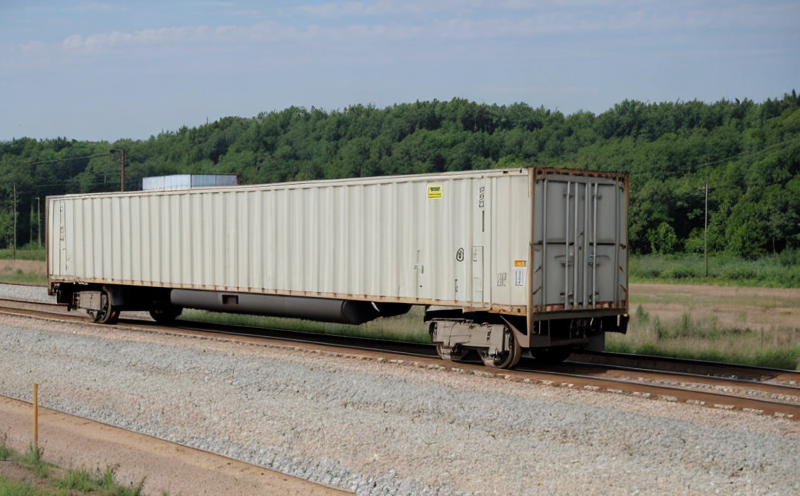UIC 577 Wagon Strength Testing under Longitudinal Loads
The UIC (Union Internationale des Chemins de Fer) 577 standard is an essential benchmark for railway wagon design and manufacturing. This test evaluates the structural integrity of wagons subjected to longitudinal loads, which are critical in ensuring safe and efficient freight transport.
Longitudinal loads arise due to dynamic forces during acceleration, braking, and uneven track conditions. They can exert significant stress on a cargo wagon's underframe, couplers, and drawgear. Compliance with UIC 577 ensures that wagons are robust enough to withstand these stresses without compromising safety or performance.
The test involves subjecting the wagon to predefined loads while monitoring deformation and structural integrity. This process requires precise control over environmental factors such as temperature, humidity, and load application rate. The testing apparatus typically includes a large hydraulic press capable of generating high-force loads over extended periods.
Preparing for UIC 577 compliance involves thorough specimen preparation. This includes ensuring the wagon's underframe is free from defects that could affect test results. Pre-loading checks are conducted to confirm the integrity of all components before subjecting them to longitudinal forces. Once prepared, the wagon undergoes rigorous testing following the prescribed load cycles.
Monitoring and recording data during the test are crucial for evaluating compliance with UIC 577 standards. Advanced instrumentation measures deformation, stress distribution, and any potential failure points in real-time. This data is then analyzed to determine if the wagon meets all specified criteria.
The importance of accurate testing cannot be overstated. Non-compliance can lead to accidents, delays, and even catastrophic failures that endanger lives and property. By adhering to UIC 577 standards, manufacturers ensure their products meet global safety and performance benchmarks.
In summary, UIC 577 wagon strength testing under longitudinal loads is a critical step in the development and certification of railway wagons. It ensures that these essential pieces of infrastructure can safely handle the dynamic forces they encounter during operation.
- Ensures compliance with international safety standards
- Identifies potential structural weaknesses early
- Promotes consistent quality across manufacturing processes
- Aids in continuous improvement and innovation
- Maintains operational reliability of railway wagons
- Reduces the risk of accidents and maintenance downtime
- Supports global certification and interoperability
- Facilitates smoother integration with other railway systems
Scope and Methodology
The scope of UIC 577 wagon strength testing under longitudinal loads encompasses a comprehensive evaluation of the structural integrity and performance characteristics of freight wagons. This involves simulating real-world conditions to assess how the wagon behaves under dynamic loading scenarios.
The methodology for this test follows international standards, primarily ISO and EN specifications. The process begins with careful specimen preparation, ensuring that all components are in optimal condition before testing. Once prepared, the wagon is subjected to a series of load cycles designed to mimic actual operational conditions.
Load application is carried out using specialized hydraulic equipment capable of generating high-force loads. These forces simulate the dynamic stresses experienced during acceleration, braking, and uneven track conditions. The test apparatus ensures precise control over environmental factors such as temperature and humidity to maintain consistency throughout testing.
Data collection is an integral part of this process. Advanced instrumentation measures deformation, stress distribution, and any potential failure points in real-time. This data is critical for evaluating the wagon's performance against UIC 577 criteria. Any deviations from expected results are documented and analyzed to identify areas for improvement.
The testing apparatus used for this service includes a large hydraulic press capable of generating high-force loads over extended periods. The press ensures consistent force application, allowing for accurate measurement and analysis. Environmental controls ensure that temperature, humidity, and other variables remain within specified limits.
Post-testing evaluation involves detailed examination of the wagon's structural integrity and performance characteristics. Any identified issues are documented, and recommendations for improvement are made based on test results. This ensures that manufacturers can address any deficiencies before releasing products to market.
Industry Applications
The UIC 577 wagon strength testing under longitudinal loads is widely used in the railway industry for various applications. Freight wagons are critical components of modern transportation systems, and ensuring their structural integrity is paramount for safe and efficient operation.
Railway operators rely on this test to verify that new wagons meet international safety standards before deployment. This helps prevent accidents and ensures compliance with regulatory requirements. By adhering to UIC 577 standards, railway companies can maintain a high level of operational reliability and performance.
Manufacturers benefit from this testing service by gaining insights into their product's structural integrity under dynamic loading conditions. This information is invaluable for continuous improvement and innovation in the design process. It also supports global certification and interoperability across different railway systems, enhancing international trade and collaboration.
The test results provide valuable data that can be used to identify potential weaknesses or areas for enhancement. Manufacturers can use this information to make informed decisions about product development and quality assurance strategies. This leads to more robust and reliable products, ultimately improving overall safety and efficiency in the railway sector.
Non-compliance with UIC 577 standards can have severe consequences, including accidents, delays, and even catastrophic failures that endanger lives and property. By ensuring compliance through rigorous testing, manufacturers contribute to a safer and more efficient transportation system.





